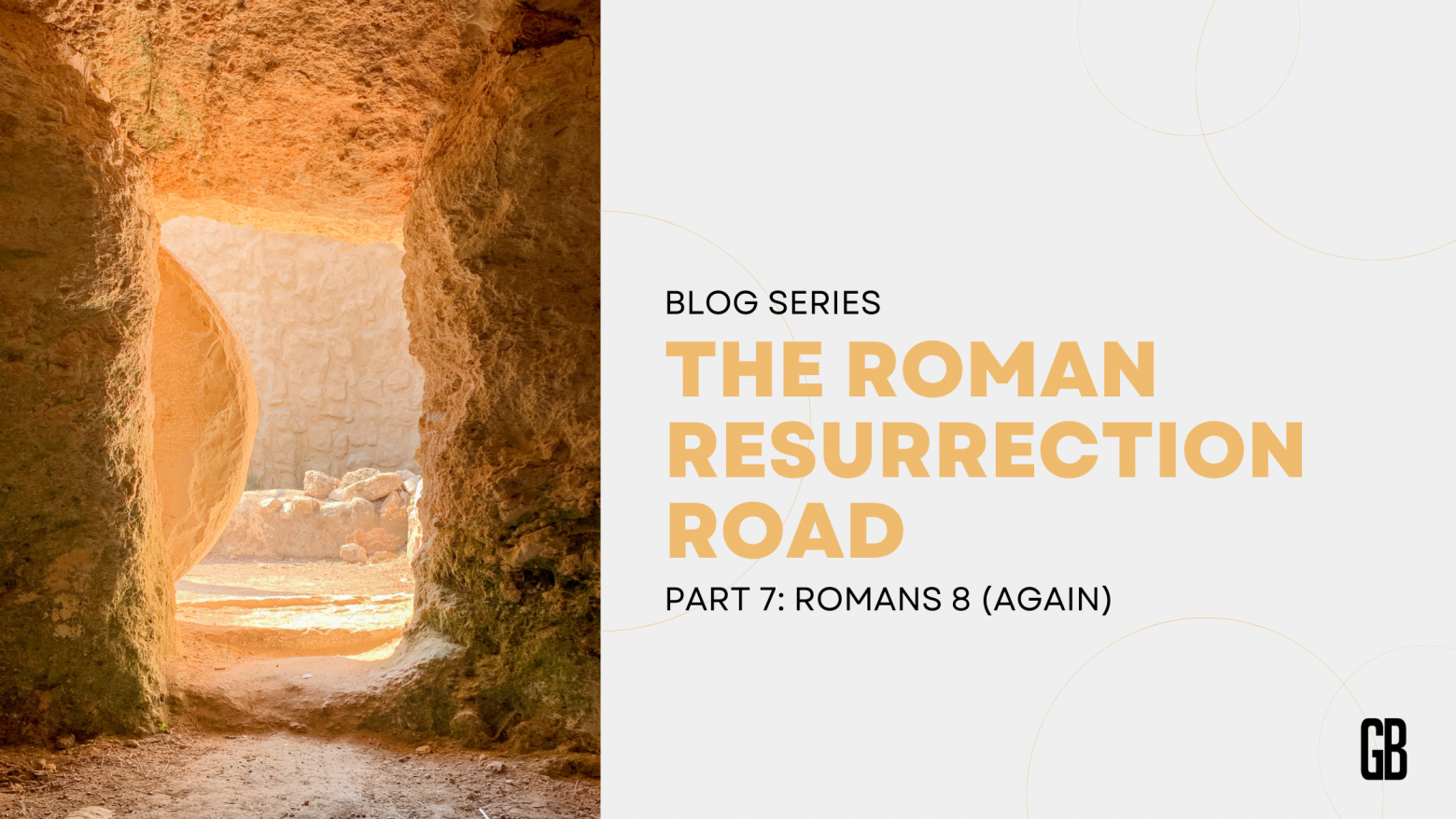This blog is part of a series of blogs concerning the Resurrection realities found in the book of Romans. To read the intro to this series, go here.
We’re coming close to the end of the Roman Resurrection road with only a couple of stops remaining. For now, we stop at Romans 8, often considered the greatest chapter in the Bible, and the crescendo of Paul’s systematic explanation of the gospel (For my money, Romans 5 is the best, but who’s counting).
For the past six or seven stops, I have zeroed in on one or two verses in order to keep these entries succinct. For this stop, I can’t justify leaving out four verses in total, and it is my desire to let them speak first:
31 What then shall we say to these things? If God is for us, who is against us? 32He who did not spare His own Son, but delivered Him over for us all, how will He not also with Him freely give us all things? 33 Who will bring a charge against God’s elect? God is the one who justifies; 34 who is the one who condemns? Christ Jesus is He who died, yes, rather who was [l]raised, who is at the right hand of God, who also intercedes for us.”
Romans 8:31-34
I imagine it’s rather obvious where the resurrection reality is in this set of verses, but I believe the build-up to the reality is worth noting. Following a strong statement from Paul regarding our calling, justification, and glorification in the previous verse, Paul asks a series of rhetorical questions beginning in verse 31:
- What shall we say to these things?
- If God is for us, who is against us?
- How will He not also with Him freely give us all things?
- Who will bring a charge against God’s elect?
- Who is the one who condemns?
It almost sounds like a lawyer, in his closing arguments after all the evidence he’s provided, resting his case. We are taught early on that understanding the five W’s is crucial to understanding any situation: who, what, why, when, where.
Some use five Ws + one H, the H being “how.”
This stretch of four verses zeros in on three of those questions: what, who, how.
Who is used 10 times.
What and how are each used once.
So the question for each verse generally seems to be, in each case, “Who is the who?”
What shall we say to these things?
Paul’s question is reminiscent of Romans 4:1 when he makes the case for justification by faith alone evidenced in the life of Abraham.
“What shall we say then that Abraham, our Father according to faith has found?”
In either place, there is an invitation to confession, meaning based on what happened in the verses before, we must adapt what we say about justification in light of the truth revealed to match the truth itself. It truly doesn’t matter what novel opinion you have to the contrary.
Many have endeavored to offer the Body some twisted form of righteousness, some framework that allows for some of your merit to factor into the equation, but it’s all bunk. It doesn’t matter what they say; let what we say align with what the Word says…I am justified by faith alone.
If God is for us, who is against us?
If we’ve understood the gospel correctly, we know that apart from Christ, we were children of wrath (Ephesians 2:3), our unrenewed minds were at enmity towards God (Romans 8:7), we couldn’t please God (8:8), and we were hopelessly dead in our trespasses and sins (Eph 2:1). No matter how hard you “tried,” this was your reality. Yet Jesus received our sin and justly bore the wrath of God on our behalf through His death on the Cross. Not only this, but we have justly and effectively been placed “in Christ.”
We are in Christ, and God is for us because He is for His Son. Will the Father ever be against Jesus? Explicitly no! In the same way, to those who are in Christ, He is for you unto eternity. That is incredible news. So now that we know that He is for us, who can be against us? You may answer this question with “a lot of people can,” but you’d be missing the point. When the King and Creator of all things is for you, it doesn’t matter who is against you.
You’ve been bought with a price, the blood of Jesus, so your value is set. Demons and every worker of inquiry may say what they will, but the One True God’s opinion will stand in eternity.
How will He not also with Him freely give us all things?
The key phrase we must never forsake in this question is “with Him.” He already paid the highest price, the greatest miracle, to bring you into His Kingdom; what’s a little room and board in light of that reality? You’ve already been given life, death, things present, and things to come. But we must walk a fine line here. This is not some overinflated prosperity blank check message.
I believe God wants us to prosper but never past the degree that we embrace prosperity that leaves behind the “with Him.” If He gave heaven’s best, it’s nothing for Him to meet our needs and bless us. Praise God for that. But balance that with the reality that Jesus was not God’s ATM Card and pathway to earthly riches, and He is worth complete devotion even if you never touch another dollar in your life. Believe for abundance, live with abandon.
Who will bring a charge against God’s elect?
This question feels similar to question two, asking “who can be against us?”. You may even say that plenty of people have plenty of reasons to bring a charge against you. You may even feel as though you’re on shaky ground, unsure if this passage holds weight for you since little ol’ you couldn’t possibly be called God’s elect. Yet this is precisely what Paul is getting at. Those in Christ are His elect, and as His elect have a ruling on their behalf, the verdict is not guilty. Oh sure, I was guilty, having no hope of getting out of the impending verdict on my own. And yet, here I stand, not guilty, because my debt has already been wiped clean and I’ve been accredited the righteousness of Christ.
You may think that sounds too good to be true, but true it is regardless. People can try to hold you to your past, accuse you, and you may even be guilty by earthly standards. But in the eternal court, the highest court, the verdict has been given. In Christ – not guilty. This is not an excuse to be an awful person on earth; in fact, a heart that responds in that way never really understood this reality in the first place. The gratitude and love that flow from truly understanding that I stand free and clear from the guilty verdict that was heading my way cause a natural love for holiness and a desire to live in a way that pleases Him.
The charges may come, but who can bring one that overrides the Judge’s final verdict? The answer is none. This is insanely good news!
Who is the one who condemns?
This is addressed to those in Christ. Notice the “o” in “one” is not capitalized because, for you, certainly, the answer cannot be God! He is the One who promises in verse one of this very chapter that “There is now therefore no condemnation for those who are in Christ Jesus.” Period! So whatever your answer may be to “ who is the one that condemns” is meant to be irrelevant – if God does not condemn me, the condemnation of man or every demon in hell is a moot point!
The only condemnation that is approved in our lives is the condemnation we approve. It’s certainly not from Him if you are in Christ! In this very chapter, verse three says “For what the law could not do, in that it was weak through the flesh, God sending his own Son in the likeness of sinful flesh, and for sin, condemned sin in the flesh.”
He would not condemn your sin in Jesus and then turn around to condemn you, Believer. There is no double jeopardy in heaven!
So after this string of rhetorical questions, the “who” identification takes a sharp turn. Up until now, the “who” has been the ones against us, bringing a charge, or seeking to condemn. But pay attention, here comes the most important “who” of all, not in the form of a question, but a statement of ironclad fact.
“Christ Jesus is He who died, yes, rather who was [l]raised, who is at the right hand of God, who also intercedes for us.”
You could almost encapsulate the entire ministry of Jesus in this one sentence.
- He died
- He was raised
- He’s seated at the right hand of God
- He’s interceding for us
We must understand that He truly died. Docetism was an early heresy that popped up after the death of Jesus, suggesting that Christ’s body was merely a phantasm or something of the like, so He did not actually physically die on the cross; He only appeared to. The Council of Nicaea eviscerated that nonsense. Muslims today endorse a similar idea, that it was not Jesus Himself who died, but rather someone “made to appear” like Him. They believe, in a sense, that someone was “substituted” for the One who provided our substitutionary atonement. Either that or the whole event of the crucifixion only “appeared” to happen but was merely a mirage. What a twist.
He was truly raised, but I don’t have to convince you why that matters at this point in the series.
He’s truly seated at the right hand of God (Psalm 110:1, Hebrews 1:13). We don’t have enough time to develop this statement in this context, but this fact reveals Jesus’ authority, divinity, and messiahship in one fell swoop. This is Christ’s “session,” His seating, meaning He truly is Lord, He has truly established the Kingdom, He has truly completed His earthly ministry, and He is truly sovereign and reigning.
We’ve traversed all of these statements and questions to arrive at this point…He’s truly interceding for us. Selah.
Think on this: the risen, exalted King who sits on the throne, in His sinless perfection, makes our case before the Father on the basis of His own perfect, finished work! If we are in Him, our case is settled! No wonder Paul says, “Who is the one who condemns?!” It doesn’t matter! Our case is settled for salvation and eternity because it is not based on our works but on His Work! Will the righteous Judge and King retract this? Never!
Therefore He is able also to save forever those who draw near to God through Him, since He always lives to make intercession for them.
Hebrews 7:25
My friends, He is able! Able to save you completely and forever! We can draw near to the Father through Him! He always lives, never to die again, and by the power of His indestructible life, He intercedes for us!
If you are in Christ, you can be absolutely confident that you will never be condemned again! There’s no double jeopardy in heaven, and He is not unjust! You can also be confident that if He’s saved you, you are saved to the uttermost: eternally and completely! That is security if I’ve ever seen it! You can be confident that He reigns! And you can be confident that your case before the Father is the best one, the Finished Work. This ought to make you free!
In short, He died but was raised. His resurrection furnished proof of His sinless perfection. His ascension was unto His session. No resurrection, no session. No session, no intercession. No intercession, no hope, no case, no faith – You are hopelessly lost in your sins. But praise God, because He was raised, He ALWAYS LIVES to make intercession for us!

I am a Pastor, Author, and Teacher based out of Kansas City, MO. I am passionate about the message of the Kingdom, Grace, Healing and the renewing of the mind. I have been following God since age 18 when I was radically transformed and inserted into revival. I have learned some hard lessons and seen some wonderful fruit in the Kingdom, and my goal is to impart wisdom and grace to you to walk in fullness. I have a walking miracle for a wife and three amazing boys.

